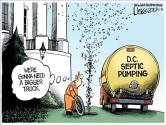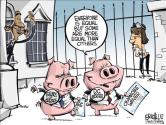I sometimes get irked when I read columns by David Brooks. He’s sort of the token Republican at the New York Times, so he has a very important perch that could be used to educate an important audience about the harmful impact of excessive government.
And Brooks often does a good job of highlighting important and worrisome social trends, but what rubs me the wrong way is that he frequently thinks the right answer is to give government even more power.
He wrote a column back in 2011, for instance, that nailed the problem of growing dependency and declining workforce participation. But then he proposed more government intervention.
And he correctly worried about the social costs of family instability in 2012, but then bizarrely decided that the right response was subsidies to make men more marriageable.
So it won’t come as much of a surprise that I’m perplexed by his reasoning in a new column on executive branch power. He starts with an observation that is true.
We’re in a period of reform stagnation. It’s possible that years will go by without the passage of a major piece of legislation.
But he thinks this is unfortunate, while I view government inaction as a positive development. Simply stated, most new laws lead to bigger government and less freedom.
I don’t want activist government – like we had during Obama’s first two years – if it means faux stimulus and government-run healthcare.
Anyhow, Brooks is unhappy and he thinks the problem is too many interest groups.
…there is the profusion of interest groups. In 1971, there were 175 registered lobbying firms. By 2009, there were 13,700 lobbyists spending more than $3.5 billion annually, and this doesn’t even count the much larger cloud of activist groups and ideological enforcers.
Recommended
He’s right that there has been an explosion in the number of lobbyists and interest groups, but his analysis is backwards.
 We have lots of influence peddlers because we have a big, sclerotic government, not the other way around.
We have lots of influence peddlers because we have a big, sclerotic government, not the other way around.
If Brooks really wants to clean out the stables in Washington, he should support a radical reduction in the size and scope of the federal government.
But you won’t be surprised that he comes to a different conclusion.
Things would be better…if we had a more unified parliamentary system, with more administrative discretion. But we don’t. “So we have a problem.” …there is a way out: Make the executive branch more powerful.
The comment about a parliamentary system is rather strange. If evidence mattered in this discussion, shouldn’t there be some explanation of why a parliamentary system was better than America’s separation-of-powers approach?
My guess, based on the mess in Europe, is that the evidence is in the other direction.
But that’s a side issue. The main point Brooks is making is that the Presidency should have more discretionary power.
Amazingly, he even cites the pervasive problems with Obamacare as a reason to augment the power of the White House!
This is a good moment to advocate greater executive branch power because we’ve just seen a monumental example of executive branch incompetence: the botched Obamacare rollout. … it is possible to mobilize the executive branch to come to policy conclusion on something like immigration reform. It’s nearly impossible for Congress to lead us to a conclusion about anything. …So how do you energize the executive? It’s a good idea to be tolerant of executive branch power grabs and to give agencies flexibility. …We need more unified authority. …Allow people in those authorities to exercise discretion.
Wow, those are some rather incredible assertions. Brooks is basically arguing against democracy and against the system of separation of powers created by the Founders.
 And the corrupt use of discretion as part of Obamacare is hardly what I would call a positive argument for his position.
And the corrupt use of discretion as part of Obamacare is hardly what I would call a positive argument for his position.
And what’s really ironic is that Brooks had a very good column on Fannie Mae and Freddie Mac back in 2011 that showed how unchecked discretionary power led to an economic crisis.
Mark Steyn has a much more logical analysis on this topic, writing that you’re much more likely to have competent government when you limit the power of Washington.
But since Brooks actually tried to equate Reagan’s small-government conservatism with Bush’s so-called compassionate conservatism, we shouldn’t be surprised he errs in other ways as well.

























Join the conversation as a VIP Member